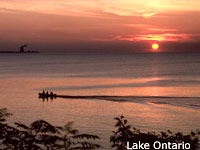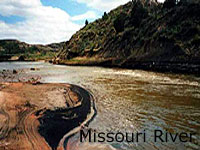
News |
- Justice Seekers Plead for Community Water Testing
- IUCN Suggests Water a Human Right
- Great Lakes Annex Meets Opposition
- Métis Hunters to Exercise Rights
- Nelson House Drinking Water Contaminated
- States and Canada Call for Review of Water Project
- Two Federal Parties Fail to Respond
- Wind Energy Should be Top Priority
- Committee Holds Water Protection Hearing
- Monsanto Breaks GM Wheat Field Trials Promise
- Hydropower Not Renewable - IRN
- Humans Cause Alberta Caribou Decline
Justice Seekers Plead for Community Water Testing |
29 September 04 |
 Concerns about drinking water quality are becoming urgent as community members in Nelson House, Manitoba continue to fall ill as requests for intervention by Indian and Northern Affairs Canada (INAC) fail to generate adequate response from federal officials.
Concerns about drinking water quality are becoming urgent as community members in Nelson House, Manitoba continue to fall ill as requests for intervention by Indian and Northern Affairs Canada (INAC) fail to generate adequate response from federal officials.Nelson House Justice Seekers spokesperson Carol Kobliski issued a press release indicating test results from a Winnipeg lab reveal unacceptably high levels of bacteria, e coli, and cloriform in the community's drinking water. The press release calls for independent testing of the Nelson House drinking water, and direct access to the results of the tests. An August 26, 2004 letter to INAC from Ms. Kobliski requesting intervention has not been answered. Two Winnipeg Free Press articles have understated the situation, even indicating there is a boil water order when no such order exists. Nelson House (Nisichawayasihk Cree Nation) is a co-proponent with Manitoba Hydro in the Wuskwatim projects proposal. The environmental report following hearings earlier this year is currently due to be released to the public. View the Justice Seekers' September 28, 2004 press release View Manitoba Wildlands' September 17, 2004 news item (with a copy of the August 26, 2004 Justice Seekers letter to INAC) View November 19, 2003 Hydro Press Release View notice at Nelson House First Nation band office Source: Nelson House Justice Seekers
|
|
IUCN Suggests Water a Human Right |
29 September 04 |
 In its recent publication Water as a Human Right?, IUCN set the stage for a debate about declaring water to be a basic human right at the international level. IUCN is also known as the World Conservation Union. Until now, the content and scope of a right to water has not been clearly defined in international law. No serious discussion about recognition of a fundamental human right to water has occurred at an international level.
In its recent publication Water as a Human Right?, IUCN set the stage for a debate about declaring water to be a basic human right at the international level. IUCN is also known as the World Conservation Union. Until now, the content and scope of a right to water has not been clearly defined in international law. No serious discussion about recognition of a fundamental human right to water has occurred at an international level. Water as a Human Right? provides a legal review of international conventions and agreements with regard to human rights and water, explores the possible content and scope of water as a human right, and examines the responsibilities of various parties. The authors conclude that a rights-based approach could be a logical means of giving effect to agreements such as the Millennium Development Goals and their reconfirmation at the World Summit on Sustainable Development. View the IUCN publication Water as a Human Right? View IUCN's Environmental Law Programme website Source: IUCN
|
|
Great Lakes Annex Meets Opposition |
29 September 04 |
 Criticism is growing as the public comment period for the draft Great Lakes Annex 2001 proposal continues. The draft Annex proposal was released in late July (see Manitoba Wildlands news item), and is intended to manage water use and define water diversions from the Great Lakes Basin. This is an annex to the Great Lakes Charter of 1985, a voluntary agreement through which the Great Lakes States and Provinces cooperatively manage the waters of the Great Lakes.
Criticism is growing as the public comment period for the draft Great Lakes Annex 2001 proposal continues. The draft Annex proposal was released in late July (see Manitoba Wildlands news item), and is intended to manage water use and define water diversions from the Great Lakes Basin. This is an annex to the Great Lakes Charter of 1985, a voluntary agreement through which the Great Lakes States and Provinces cooperatively manage the waters of the Great Lakes.The Council of Canadians has spoken out in opposition to the draft Annex and is urging Canadians to demand more stringent conservation measures to protect the largest freshwater ecosystem in the world, which is the drinking water source for one third of all Canadians. The draft Annex is being criticized as failing to restrict how much water can be withdrawn from the Great Lakes, and leaving the door open for long distance water removals and water exports. The Annex fails to distinguish between water uses inside the water basin and water uses outside the Great Lakes ecosystem. Other critics have labeled the draft Great Lakes Annex 2001 a complex water-taking permit program, as opposed to a resource-based conservation standard that would keep the water where it belongs: in the basin. View the Walter & Duncan Gordon Foundation - Water Issues View the Council of Canadians web page on the Great Lakes Annex View the Detroit Free Press article View the Milwaukee Journal Sentinel article View the August 18, 2004 Manitoba Wildlands news item on the proposed Great Lakes Annex View the Council of Great Lakes Governors for the Great Lakes Water Management Initiative Sources: Council of Canadians, Detroit Free Press, Milwaukee Journal Sentinel
|
|
Métis Hunters to Exercise Rights |
17 September 04 |
 Manitoba Métis hunters were issued Métis Harvester Identification Cards in a ceremony September 9, 2004, despite refusal by the Manitoba Minister of Conservation to recognize Métis' right to harvest for subsistence purposes, similar to the right of other Aboriginal peoples in Canada.
Manitoba Métis hunters were issued Métis Harvester Identification Cards in a ceremony September 9, 2004, despite refusal by the Manitoba Minister of Conservation to recognize Métis' right to harvest for subsistence purposes, similar to the right of other Aboriginal peoples in Canada.The September 2003 Supreme Court of Canada Powley Decision recognized the Métis as a distinct Aboriginal people and affirmed aboriginal hunting and fishing rights to Métis who can show their connections to ancestral communities which continue to hunt and fish today. The Court also acknowledged the urgent need to identify Métis rights-holders through an objective and verifiable process. Manitoba Métis Federation (MMF) President David Chartrand met with Conservation Minister Stan Struthers earlier in the week, but Minister Struthers said his department will charge cardholders if they break the law. Struthers said the province is working on new rules for Métis hunters that are in keeping with the recent Supreme Court ruling. He did not know when the new rules would come into effect. Métis leaders maintain that Manitoba is ignoring the 1982 Canadian Constitution and disregarding the Supreme Court. The MMF will challenge the province by having cardholders take part in a mass hunt. View the September 9, 2004 MMF press releases View the CBC Manitoba Online article Sources: MMF, CBC Manitoba
|
|
Nelson House Drinking Water Contaminated |
17 September 04 |
 Members of Nelson House (Nisichawayasihk Cree Nation) are becoming ill and are blaming drinking water contaminated by sewage and fecal matter, and unclean, unsafe water storage tanks.
Members of Nelson House (Nisichawayasihk Cree Nation) are becoming ill and are blaming drinking water contaminated by sewage and fecal matter, and unclean, unsafe water storage tanks.In an August 26, 2004 letter to the Regional Director General of Indian and Northern Affairs Canada (INAC), Carol Kobliski describes problems with the location and condition of the community's sewage lagoon, inaction from Chief and Council to address concerns voiced by members of the community, and water storage tanks containing dirt and green slime. On her own behalf, and on behalf of others who have become ill with Helicobacter Pylori, Ms. Kobliski is petitioning INAC to intervene and ensure that community funds are directed to address the concerns outlined in the letter. View the August 26, 2004 letter to Indian and Northern Affairs Canada View the November 19, 2003 Letter Of Understanding Reached On NFA Agreement Arbitration Claim Source: JustEnergy
|
|
Two Federal Parties Fail to Respond |
17 September 04 |
 Two of Canada's five national political parties did not respond to Manitoba Wildlands' 2004 federal election survey about environmental issues in Manitoba. Questions were specifically about areas where there are federal responsibilities. The Conservative Party of Canada and the Bloc Quebecois both deferred answering the survey until after the June 2004 election, citing time constraints. Two letters sent by Manitoba Wildlands in July and August 2004 requesting responses produced no response from either party.
Two of Canada's five national political parties did not respond to Manitoba Wildlands' 2004 federal election survey about environmental issues in Manitoba. Questions were specifically about areas where there are federal responsibilities. The Conservative Party of Canada and the Bloc Quebecois both deferred answering the survey until after the June 2004 election, citing time constraints. Two letters sent by Manitoba Wildlands in July and August 2004 requesting responses produced no response from either party.View the June 21, 2004 Manitoba Wildlands news item View Manitoba Wildlands 2004 federal election survey and responses |
|
Wind Energy Should be Top Priority |
17 September 04 |
 Canada's re-elected Liberal government should use its October 5th, 2004 throne speech to make wind energy one of its initial priorities and reaffirm campaign promises to increase support for the industry. In an August 6, 2004 letter to Prime Minister Paul Martin, the Canadian Wind Energy Association (CanWEA) challenges the government to act on its commitment to see 5% of Canada's electricity generated by wind energy within a decade. They also challenge the government to quadruple the Wind Power Production Incentive to support installation of 4000 MW of new wind capacity. CanWEA also urged Martin to develop a Wind Energy Strategy for Canada.
Canada's re-elected Liberal government should use its October 5th, 2004 throne speech to make wind energy one of its initial priorities and reaffirm campaign promises to increase support for the industry. In an August 6, 2004 letter to Prime Minister Paul Martin, the Canadian Wind Energy Association (CanWEA) challenges the government to act on its commitment to see 5% of Canada's electricity generated by wind energy within a decade. They also challenge the government to quadruple the Wind Power Production Incentive to support installation of 4000 MW of new wind capacity. CanWEA also urged Martin to develop a Wind Energy Strategy for Canada.View the letter from CANWEA to the Prime Minister View the Liberal Party Election Platform Bulletins (see page 40 of 53 for commitments re: wind energy) Source: CanWEA
|
|
Committee Holds Water Protection Hearing |
15 September 04 |
 The Manitoba Legislative committee hearings for Bill 22, The Water Protection Act were held September 13, 2004. Gaile Whelan Enns, Manitoba Wildlands Director, was among a full roster of presenters, from across Manitoba. A variety of concerns, objections, and requests for changes to Bill 22 were heard. Common concerns included: lack of funding for watershed planning and scientific studies, lack of clarity in the Bill's definitions, insufficient consultation and appeal mechanisms.
The Manitoba Legislative committee hearings for Bill 22, The Water Protection Act were held September 13, 2004. Gaile Whelan Enns, Manitoba Wildlands Director, was among a full roster of presenters, from across Manitoba. A variety of concerns, objections, and requests for changes to Bill 22 were heard. Common concerns included: lack of funding for watershed planning and scientific studies, lack of clarity in the Bill's definitions, insufficient consultation and appeal mechanisms. The purpose of the new Act would be to provide protection and stewardship to Manitoba's water resources and aquatic ecosystems, especially drinking water sources. It includes provisions for watershed management plan, and would establish a Water Council and the Water Stewardship Fund. The Water Council would have an advisory role to the minister, and monitor watershed management plans. The Water Stewardship Fund would support research and assist for watershed management plans. Manitoba Wildlands raised concerns about the reactive nature of the Act, coordination with other Manitoba acts respecting water use, and the need to identify and protect headwaters and other sensitive water sources immediately. "We provided a list of terms not defined in the Bill, and pointed out that the basis for watershed planning must be identification of source waters. It is also difficult to tell which of the many Acts regarding water resources will prevail. We recommended a compliance review of all water law in Manitoba." View Manitoba Wildlands' presentation to the Legislative Committee View Manitoba Wildlands' attachment to presentation View Manitoba Wildlands' comparative analysis of Water Strategy View Glen Koroluk's presentation to the Legislative Committee View Bill 22 - The Water Protection Act View Manitoba Legislature Committee Minutes for Sept. 13, 2004 Sources: Manitoba Wildlands, Government of Manitoba
|
|
Monsanto Breaks GM Wheat Field Trials Promise |
15 September 04 |
 Biotech giant Monsanto continues its genetically modified wheat field trials in Canada, despite its May 2004 pledge that testing would be abandoned, according to an August 17, 2004 Greenpeace press release.
Biotech giant Monsanto continues its genetically modified wheat field trials in Canada, despite its May 2004 pledge that testing would be abandoned, according to an August 17, 2004 Greenpeace press release.In a letter to Greenpeace dated July 29th, 2004, the Canadian Food Inspection Agency confirmed that sixteen Roundup Ready wheat field trials are taking place in 2004 "to allow researchers to complete their research." In their press release and in interviews, Monsanto had stated that the company would discontinue breeding and field level research of Roundup Ready wheat. Greenpeace and other groups maintain that the field trials are a danger for both the environment and for the potential for release for farmers. Many export markets, Japan and the European Union among them, have warned they would stop buying wheat from Canada if any of it is genetically modified. Monsanto has been criticized on the grounds that continued trials could pose a serious threat to Canada's ability to export wheat. View the Greenpeace press release View the CNEWS article Sources: Greenpeace, CNEWS
|
|
Hydropower Not Renewable - IRN |
8 September 04 |
 The International Rivers Network released a declaration in June 2004, to coincide with landmark inter-ministerial "Renewables 2004" conference, hosted by the German government in Bonn. The declaration, "12 Reasons to Exclude Large Hydro from Renewables Initiatives" is endorsed by 260 citizen's groups, networks and coalitions from 61 countries. The David Suzuki Foundation is among Canadian endorsements.
The International Rivers Network released a declaration in June 2004, to coincide with landmark inter-ministerial "Renewables 2004" conference, hosted by the German government in Bonn. The declaration, "12 Reasons to Exclude Large Hydro from Renewables Initiatives" is endorsed by 260 citizen's groups, networks and coalitions from 61 countries. The David Suzuki Foundation is among Canadian endorsements.The declaration states that funds to reduce the climatic and other environmental impacts of energy production and consumption, to advance sustainable development, and to increase energy security should be used for the promotion of "new renewables." The most important new renewables are modern biomass, geothermal, wind, solar, marine energy, and small hydro compliant with the recommendations of the World Commission on Dams. The 12 Reasons to Exclude Large Hydro are:
View the summary of the IRN declaration View the full IRN declaration Source: International Rivers Network
|
|
Humans Cause Alberta Caribou Decline |
8 September 04 |
 University of Alberta (U of A) researchers have concluded that the most detrimental factor on caribou population dynamics is the loss of habitat resulting from avoidance of good quality habitat close to industrial infrastructures. The scientists, at the Department of Renewable Resources, developed computer models that simulate the ecosystem of a 20,000 square km area in northern Alberta. They introduced different variables into the models to see what effect, if any, the changes had on the simulated ecosystem.
University of Alberta (U of A) researchers have concluded that the most detrimental factor on caribou population dynamics is the loss of habitat resulting from avoidance of good quality habitat close to industrial infrastructures. The scientists, at the Department of Renewable Resources, developed computer models that simulate the ecosystem of a 20,000 square km area in northern Alberta. They introduced different variables into the models to see what effect, if any, the changes had on the simulated ecosystem.The models showed if human developments continue at the current rate, the number of woodland caribou in the area would drop sharply in about 15 years, and continue dropping until they are eliminated from the area in 37 years. Caribou require an environment with large areas of old-growth forests in order to survive, and most things that disrupt the natural environment will be detrimental to them. They are an 'indicator' species, meaning that how well they do is generally a good indicator to gauge the overall health of the forests where they live. View the University of Alberta press release Source: University of Alberta
|
|


 RSS Feeds:
RSS Feeds: A project that could divert water from the Missouri River into Devils Lake is under fire from the state of Missouri, as well as Minnesota and Canada. The project is not related specifically to the Devils Lake project in North Dakota that is being challenged by Manitoba and US state and environmental and tribal allies (see Manitoba Wildlands news item of August 31, 2004). That project would create an outlet in Devils Lake to the Sheyenne River, which brings water to the Red River. However, if both projects become a reality, water would be transferred from one side of the continent to the other, one river system to the other.
A project that could divert water from the Missouri River into Devils Lake is under fire from the state of Missouri, as well as Minnesota and Canada. The project is not related specifically to the Devils Lake project in North Dakota that is being challenged by Manitoba and US state and environmental and tribal allies (see Manitoba Wildlands news item of August 31, 2004). That project would create an outlet in Devils Lake to the Sheyenne River, which brings water to the Red River. However, if both projects become a reality, water would be transferred from one side of the continent to the other, one river system to the other.